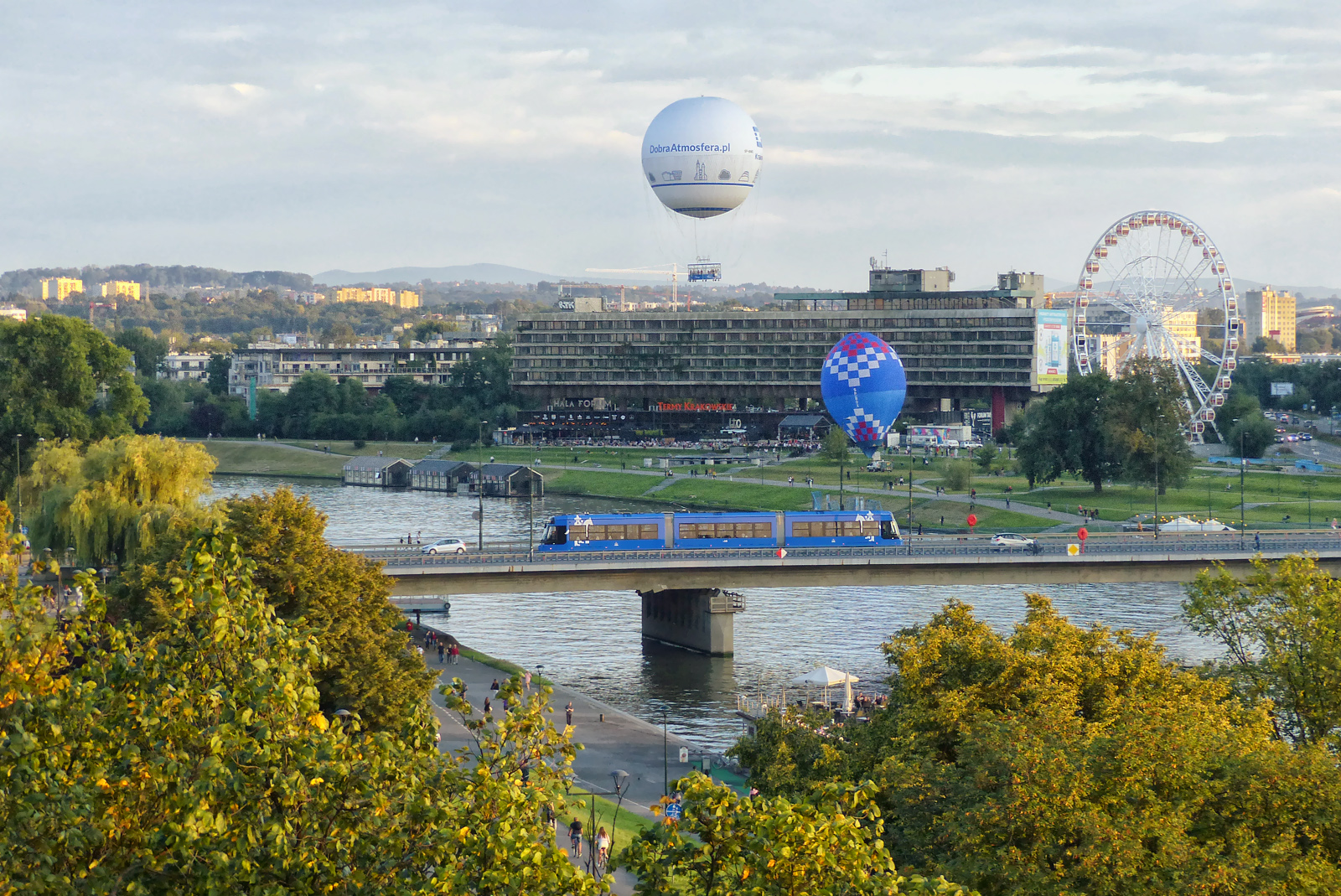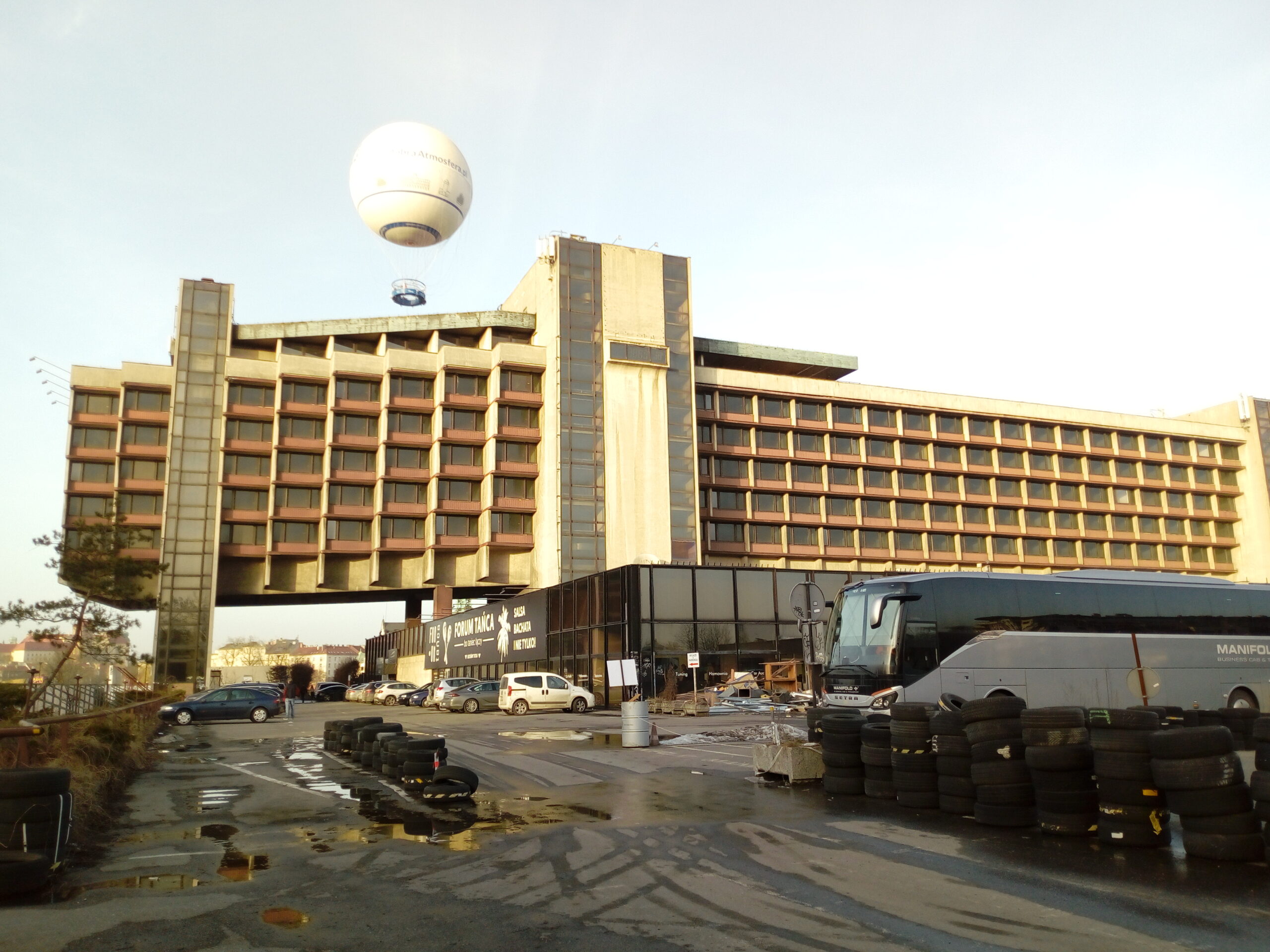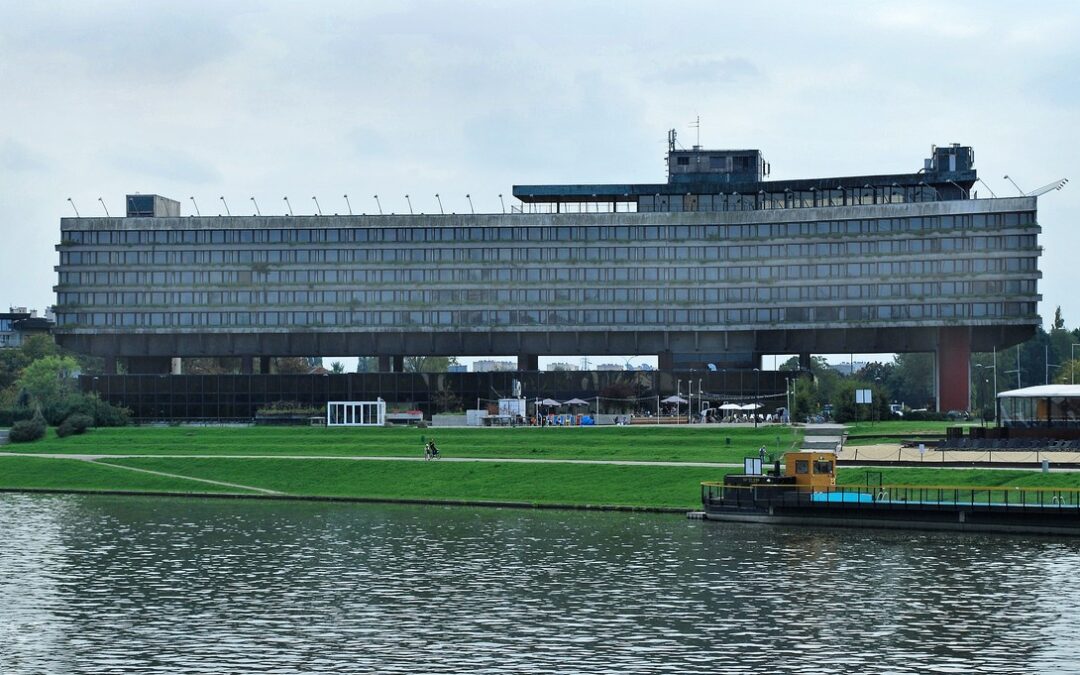Keep our news free from ads and paywalls by making a donation to support our work!

Notes from Poland is run by a small editorial team and is published by an independent, non-profit foundation that is funded through donations from our readers. We cannot do what we do without your support.
A brutalist, communist-era hotel in Kraków that closed to guests over two decades ago has been added to Poland’s official register of protected monuments.
Conservators found that it has historic, architectural and social value that needs to be protected, calling it “an element of the city’s identity”. But the decision has been criticised by the current owners of the building, who say it will hinder plans to redevelop the area.
When Hotel Forum opened in 1988 – after a decade of construction – it was one of the most modern buildings in Poland, featuring cutting-edge technology, such as computerised reservation and food ordering systems, as well as luxuries including air conditioning and a swimming pool.
However, the communist system under which it had been built collapsed just a year later, and Forum did not last much longer. It closed in 2002 and has remained largely empty since.
For much of that time, the building – with its prime location on the Vistula River, visible from the historic Wawel Castle, one of Poland’s most popular tourist attractions – functioned as the country’s longest billboard, with large banner adverts covering most of its facade.
Various businesses have at different stages operated within the former hotel, including a go-karting track in its car park as well as bars, restaurants and nightclubs inside the building.

Hotel Forum seen from around Wawel Castle (source: Michał Kwaśniak/Flickr, under CC BY-NC-ND 2.0)
On Friday, the Provincial Office for the Preservation of Monuments (WUOZ) in Kraków announced that Hotel Forum has been added to the register of historic monuments, a decision requested by the Kraków branch of the Association of Polish Architects.
WUOZ found that the building “has historical value, as a testament to the communist era and the modernisation aspirations of the 1970s and 1980s”, and “artistic and architectural value, as an example of the modernist style in its variety known as brutalism”, spokesman Jan Kozakowski told broadcaster TVN.
The former hotel also has “social and landscape value, as an element of the city’s identity and an element of public space…and it also plays an important role in the urban history of Kraków”, he added.
One consequence of that decision is that the local conservator of monuments will conduct periodic inspections of its state of preservation and, if necessary, issue recommendations for how to improve it. Any planned renovation work on the property would require special conservation approval.
The owner of the building, investment fund Amatheus, had previously written to WUOZ appealing for Hotel Forum not to be added to the list of monuments, saying that it would be “contrary to the public interest”.
Its CEO, Dominik Koza, told newspaper Gazeta Krakowska that the decision could result in the building remaining in its current rundown state “for decades”. That would “prevent any positive changes for this area, permanently negatively impacting the interests and image of the city of Kraków”.
However, a former provincial conservator of monuments, Monika Bogdanowska, told local news website Kraków dla Was that she believes the owner has no real interest in redeveloping the area.
It simply wants to exploit the prime location around the former hotel – which has turned into a kind of funfair, with various colourful attractions – while avoiding the costs of maintaining the historic building, said Bogdanowska.

The rear view of Hotel Forum in 2021 (source: Grawiton/Wikimedia Commons, under CC BY-SA 4.0)
The head of WUOZ, Katarzyna Urbańska, explained to Radio Kraków that their decision relates only to the exterior of the building, not its interior, which can still be redeveloped for other uses.
The building almost certainly cannot function again as a hotel, though, given that its ceiling heights and corridor widths are below current requirements.
Another abandoned communist-era hotel in Kraków, the Cracovia Hotel, was likewise added to the register of historic monuments in 2016. In 2021, plans were announced to turn it into a museum of architecture and design. However, those have so far remained in development.
Earlier this month, a famous communist-era monument in Rzeszów, which has become a symbol of the city, was saved from potential demolition after also being added to the list of protected monuments.
A huge communist-era monument in Rzeszów – the city's most famous, but controversial, landmark – has been saved from demolition after being added to Poland’s list of protected monuments https://t.co/aKdS80V8RK
— Notes from Poland 🇵🇱 (@notesfrompoland) October 3, 2025

Notes from Poland is run by a small editorial team and published by an independent, non-profit foundation that is funded through donations from our readers. We cannot do what we do without your support.
Main image credit: Zygmunt Put/Wikimedia Commons (under CC BY-SA 4.0)

Daniel Tilles is editor-in-chief of Notes from Poland. He has written on Polish affairs for a wide range of publications, including Foreign Policy, POLITICO Europe, EUobserver and Dziennik Gazeta Prawna.



















